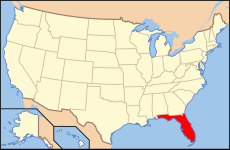Portal:Florida/Intro

Florida /ˈflɒrɪdə/ is a state located in the southeastern region of the United States. Most of the state is a large peninsula with the Gulf of Mexico on its west and the Atlantic Ocean on its east. Much of the state has a humid subtropical climate; southern Florida has a tropical climate. Florida was named by Juan Ponce de León, who landed on the peninsula on 2 April 1513, during Pascua Florida (Spanish for "Flowery Easter," referring to the Easter season). Florida is the third most populous state in the country.
Archaeological research indicates that Florida had been inhabited for thousands of years before any European settlements. Of the many indigenous peoples, the largest known were the Ais, the Apalachee, the Calusa, the Timucua and the Tocobago tribes. Juan Ponce de León, a Spanish conquistador, named Florida in honor of his discovery of the land on April 2, 1513, during Pascua Florida, a Spanish term for the Easter season (Juan Ponce de León may not have been the first European to reach Florida; according to one report, at least one indigenous tribesman who he encountered in Florida in 1513 spoke Spanish.) From that date forward, the land became known as "La Florida" , although from 1630 until the 19th century Tegesta (after the Tequesta tribe) was the name of choice for the Florida peninsula following publication of a map by the Dutch cartographer Hessel Gerritsz in Joannes de Laet's History of the New World. Over the following century, both the Spanish and French established settlements in Florida, with varying degrees of success. In 1559, Spanish Pensacola was established by Don Tristán de Luna y Arellano as the first European settlement in the continental United States, but it had become abandoned by 1561 and would not be reinhabited until the 1690s. French Huguenots founded Fort Caroline in modern-day Jacksonville in 1564, but the fort was conquered by Spanish forces from St. Augustine the following year.
